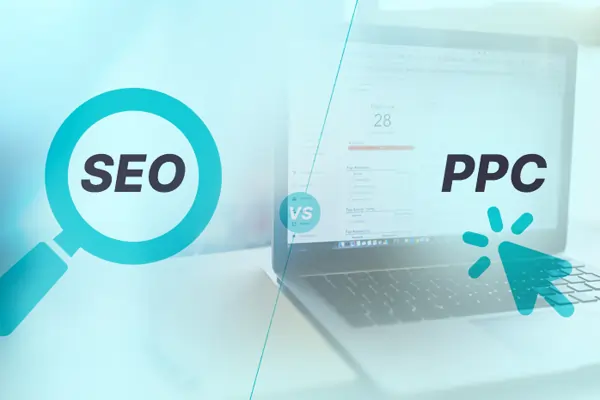Within the realm of digital marketing, companies can implement a variety of strategies in order to drive traffic, procure leads, and increase sales. SEO and PPC are two of the most heavily employed strategies among them. Both have strengths and weaknesses. This article will explain what PPC and SEO are, their advantages, and how companies can choose the approach that best suits their requirements.
What is SEO?
SEO is the art of getting a website to rank higher on search engine result pages (SERPs) for particular keywords. The objective of SEO is to increase more organic (free) traffic by improving the visibility and relevance of a website in search results. SEO encompasses many techniques such as keyword optimization, content creation, backlinking, and technical SEO to improve a site's overall performance.
There are three main aspects of SEO:
On-page SEO: Optimizing the content, meta descriptions, headings, and images on a page according to search intent.
Off-page SEO: Establishing a site's authority through backlinks, social shares, and other off-page signals.
Technical SEO: Optimizing the technicalities of the site, such as page speed, mobile usability, and site structure.
What is PPC?
Pay-Per-Click (PPC) is a form of paid advertising in which businesses pay for every click on their ads. Search engines like Google Ads, Bing Ads, and social media platforms offer PPC campaigns in which advertisements are viewed on search engine pages or social media websites. In a PPC campaign, the advertiser puts a bid on keywords, and their advertisement is displayed when those keywords are searched.
In contrast to SEO, which aims at organic results, PPC gains instant exposure through the placement of ads at the top of search engine results pages or social media news feeds. The most common forms of PPC include search ads, display ads, and social ads.
SEO vs. PPC: Main Differences
Cost
The most important distinction between SEO and PPC is the cost model. While PPC involves regular expenditure by the click, SEO is governed by progressive long-term development. PPC promises instant exposure, yet traffic disappears after the budget exhausts itself. SEO provides long-term reward because top ranking in search engines can bring persistent natural traffic without periodic payment obligations.
SEO, however, might be more affordable in the long term, particularly when optimizing for competitive search terms. But it takes time, resources, and skills to rank high. PPC, on the other hand, gives faster outcomes but is not always applicable for all businesses due to high ongoing costs.
Time to Results
The second and most fundamental difference between PPC and SEO is time in the sense of obtaining results. SEO is a process that takes several months of careful efforts before one can notice meaningful results. This entails building backlinks, content optimization, and page speed improvement.
Conversely, PPC gives instant results. You can create a PPC campaign and bid on keywords, and your ads would be up on search engines or social media sites instantly, giving you instant traffic. This is why PPC is ideal for companies requiring quick exposure and short-term outcomes.
Traffic Quality
Both SEO and PPC send quality traffic to a website, though the quality can vary. Organic traffic generated by SEO is highly relevant because users who reach your site through search are likely to be actively looking for your products or services. Also, SEO traffic has higher credibility because it is generated through search engines and not through paid ads.
PPC, though providing instantaneous outcomes, at times might draw clicks from users who are less invested. PPC, however, enables exact targeting according to demographic, interest, and behavior factors, so that ads get delivered to users who are most capable of converting.
Brand Visibility
SEO and PPC both influence brand visibility. SEO causes your website to become more visible on organic search, creating authority and trust in the long term. PPC gives your brand greater exposure by displaying your ad at the top of the search regardless of your organic ranking.
Moreover, PPC allows you to be in command of your brand message, with the flexibility of making your ads consistent across different markets and audiences. This offers a level of targeting and customization that SEO cannot provide.
Which Digital Marketing Strategy is Best for Your Business?
The choice between SEO and PPC will hinge on numerous factors, including your goals, budget, and level of competition.
Long-term vs. Short-term Goals: If you want long-term, enduring growth, SEO is your choice. You might not see the results in the short term, but the traffic you gain in the long run is free once you rank high. However, if you need instant exposure, PPC is the choice for short-term purposes.
Budget: PPC is expensive, especially for high-volume keywords. With a limited budget, SEO is a more affordable option in the long term.
Target Audience: PPC works well for businesses that need to target specific groups of people, interests, and search patterns. SEO, however, is ideal for gaining organic traffic from users who are actively looking for related content.
Competitive Landscape: For highly competitive markets, getting good organic rankings is difficult. In such cases, PPC is an instant solution to get instant visibility and create targeted traffic.
Conclusion
Both SEO and PPC are effective online marketing tools that can assist in generating traffic, generating leads, and boosting sales. The most optimal strategy will be based on your business goals, budget, and time horizon. An integrated approach that balances SEO for sustainable growth and PPC for instant visibility will often prove to be the most suitable option for businesses that seek success in today's digital marketplace. Through an appreciation of the subtleties of SEO and PPC, companies can develop a marketing plan that suits their objectives, maximizing short- and long-term outcomes.
.webp)










.webp)































.webp)
